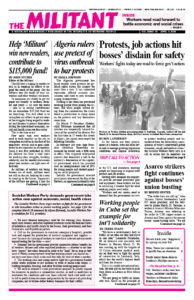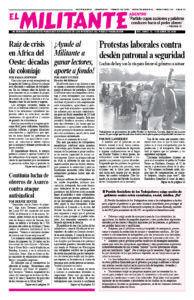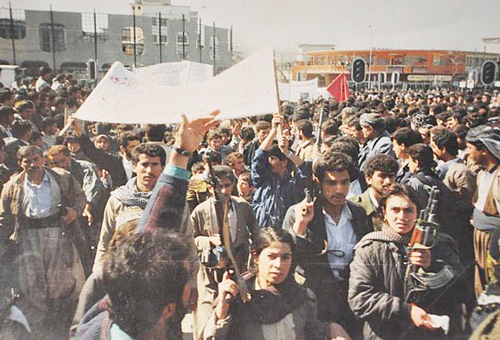Some 30 million Kurds across the Middle East have fought for their national rights and sovereignty, long denied them, by the rulers in Iran, Iraq, Syria and Turkey. Their fight has continued in the midst of the endless wars in the region inflicted by U.S. imperialism and the ruling classes across the area.
On March 16 Kurds in Iraq and elsewhere commemorated the 1988 chemical weapons massacre by the Saddam Hussein regime in Halabja. The horrors of that assault — which killed 5,000 people and injured 10,000 — failed to quell the fight for a Kurdish homeland and fueled another uprising by Kurds against Saddam just three years later.
“We know that many events have been cancelled but I feel like there are certain things that are important to do and we will not allow it to be forgotten,” Brian Futcher, organizer of a memorial service to honor those killed at Halabja in Southsea, England, told the Portsmouth News March 16.
Halabja was targeted by the Iraqi government as part of its 1988 Anfal campaign of extermination and forced removal of Kurds, during the latter part of its eight-year war on Iran. That war, fought with Washington’s help, was aimed at pushing back the 1979 revolution in Iran that had overturned the dictatorship of the U.S.-backed shah. It was coupled with moves by the Saddam regime to crush resistance in Iraq’s Kurdish region.
In addition to the tens of thousands of Kurds who were killed or forcibly relocated, the regime’s genocidal assaults forced some 100,000 to flee to Iran, where they were welcomed and offered support by fellow Kurds.
The Anfal and Halabja attacks were organized by Ali Hassan al-Majid, Saddam’s cousin, better known to the Kurds as “Chemical Ali” for ordering poison-gas attacks on Kurdish villages. Saddam’s forces sought to replace the Kurds with Iraqi Arabs, who were offered cheap land. Kurds captured during the offensive were removed to other parts of the country and forbidden under threat of execution from returning.
The assault on Halabja was launched days after it was captured by Kurdish peshmerga fighters and allied Iranian Revolutionary Guard, which was fighting to repel Baghdad’s invasion of Iran.
Saddam’s forces struck Halabja with artillery fire and napalm to drive residents into underground shelters or out into the streets. Then they launched poison-gas bombing attacks using sarin and other deadly toxins aimed at exterminating the town’s population. Sarin is heavier than air and easily penetrated into the shelters. In the immediate aftermath of the onslaught Saddam’s regime expanded its Anfal offensive, including further gas attacks, and took control of other territory held by Kurdish fighters.
Washington backed the Iraqi rulers’ 1980-88 war on Iran, though it publicly claimed “neutrality.” CIA files unearthed later show Washington provided Saddam’s military with targeting information throughout the Anfal campaign. The U.S. rulers kept quiet about Baghdad’s assaults on Kurds until they sharply shifted their policy against Saddam’s regime and began publicizing its brutality in order to rationalize U.S. imperialism’s 1990-91 war against Iraq.
In 1990 the Saddam regime invaded Kuwait, offering Washington an excuse to unleash its own bloody slaughter. After the notorious “turkey shoot” that slaughtered thousands of fleeing Iraqi soldiers, the U.S. government declared a military victory.
Far from creating better conditions to enforce U.S. imperialism’s domination of the region, Washington’s assault exacerbated turmoil and class and national struggles there. The Kurdish people took advantage of the weakening of the Iraqi rulers and revolted across northern Iraq, driving out Saddam’s forces. At the same time, the Shiite population of southern Iraq rose up against Saddam’s hated government.
Washington’s war had unintended consequences. “Baghdad’s defeat opened a wedge for our uprising and then in 1992 for the establishment and survival of the Kurdistan Regional Government in northern Iraq,” Hazhar Majeed, owner of a the Endese bookshop in Sulaymaniyah, part of the KRG’s territory, told Militant reporters in a 2017 interview.
After a second U.S. intervention in 2003 overthrew Saddam, mobilizations against successive Iraqi regimes have taken place, including today’s battle to rid the country of its current government and end Tehran’s and Washington’s intervention there.
Struggle for Kurdish sovereignty
The Kurdish people had been denied a homeland when the imperialist governments of France and the U.K. carved up the Mideast after the overthrow of the Ottoman Empire in the first imperialist world war. But the Kurds have never stopped fighting to win sovereignty. Slaughters like that at Halabja only deepened their determination.
Neither Washington nor Baghdad anticipated the depth of the Kurds’ rebellion. “The Kurdish people have come to the center stage of world politics as never before, not primarily as victims, but as courageous and determined fighters,” Socialist Workers Party National Secretary Jack Barnes wrote in “Opening Guns of World War III: Washington’s Assault on Iraq” in New International no. 7.
The capitalist rulers in Iran, Iraq, Syria and Turkey remain determined to prevent advances in the Kurdish people’s fight for national rights. But the impact of today’s wars, and the economic and social crises that go with them, will deepen the Kurds’ resolve to prevail. And further struggles by workers and farmers across the region will provide the Kurds with allies.


